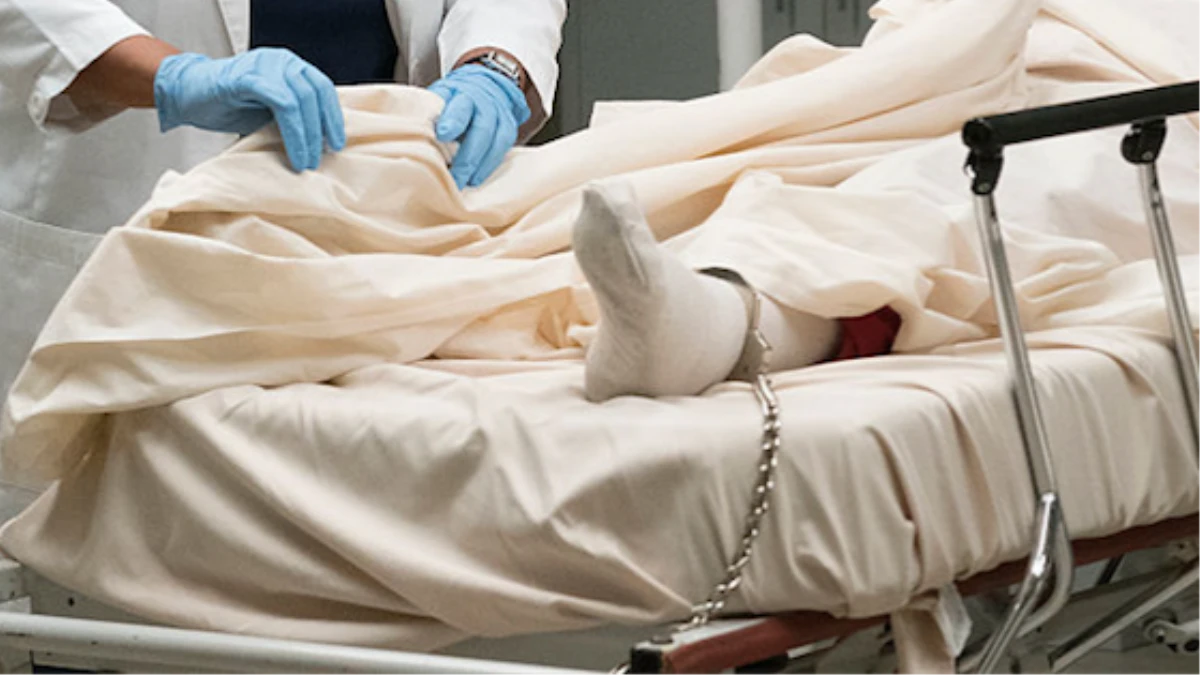By: Maite Irizarry-Iraolagoitia, Kirra Crane, and Sadie Chaney
During the prenatal and postnatal time period, in order to prevent complications, the right type of care is a necessity. This includes prenatal vitamins, nutritious food, ultrasound appointments— all of above is not provided in a prison complex. Despite the 8th Amendment stating, “excessive bail shall not be required, nor excessive fines imposed, nor cruel and unusual punishments inflicted,” thousands of incarcerated women that are pregnant are treated ruthlessly. For example, many women are shackled to a bed when delivering their child, do not receive proper care, are separated from their children soon after delivery, and do not have the option of abortion. After all, it is exhausting enough for a woman with support to be pregnant, for it seems unimaginable to be carrying a child with your conditions unfavored.
We have grown quite accustomed to the image of a prisoner in handcuffs. However, many do not consider that these policies are always in place, including during labor. Despite being banned in 40 states, there are reports coming from the prisons of these states detailing active shackling during all stages of pregnancy. This includes early pregnancy all the way to the third trimester. Some women even report being shackled to a bed during labor despite the doctor’s requests to have them released.
 Labor is not the only issue expecting mothers face in prison. Perinatal care, including vitamins and screenings, is sorely lacking. In the article “The Realities of Pregnancy and Mothering While Incarcerated,” Friedman and co-authors address perinatal health care standards. “The American College of Obstetrics and Gynecology (ACOG) standards for perinatal care in correctional settings include pregnancy testing; access to pregnancy counseling and abortion services; assessing and treating for substance abuse, HIV, and depression; appropriate vitamins and diet; delivery in a licensed hospital with facilities for high-risk pregnancies; and postpartum contraception.” Despite this standard, many women report a lack of perinatal care and services. Some women are not even given a pregnancy test upon entry to prison- instead the prison relies on their word. According to the Prison Policy Initiative, four percent of women admitted to prison are pregnant. Many of these women did not know they were pregnant until after their admission to prison.
Labor is not the only issue expecting mothers face in prison. Perinatal care, including vitamins and screenings, is sorely lacking. In the article “The Realities of Pregnancy and Mothering While Incarcerated,” Friedman and co-authors address perinatal health care standards. “The American College of Obstetrics and Gynecology (ACOG) standards for perinatal care in correctional settings include pregnancy testing; access to pregnancy counseling and abortion services; assessing and treating for substance abuse, HIV, and depression; appropriate vitamins and diet; delivery in a licensed hospital with facilities for high-risk pregnancies; and postpartum contraception.” Despite this standard, many women report a lack of perinatal care and services. Some women are not even given a pregnancy test upon entry to prison- instead the prison relies on their word. According to the Prison Policy Initiative, four percent of women admitted to prison are pregnant. Many of these women did not know they were pregnant until after their admission to prison.
What happens after labor is also an issue. In some states mothers are separated from their newborns only a few hours after giving birth. In others, this number rises to six months. Their newborn is often put into foster care or sent to be raised with the family of the incarcerated mother. A newborn is not supposed to be separated from its mother so soon. The minimum for separation of a newborn from a mother is six months, but it is often advised to leave the child with its mother as long as possible in order to avoid trauma as well as both long-term and short-term health complications for both the mother and child.
Prenatal care is particularly important in the state of Louisiana because of the lack of access to abortion. It is completely banned from conception in the entire state. Naturally, this then applies to all Louisiana inmates as well. While civilians are able to travel to other states to receive an abortion, women in prison do not have that luxury. All unwanted pregnancies, conceived inside or outside of prison, have to be carried to term. The issue of unlicensed doctors in these facilities causes pregnancy to carry an increased danger to mothers because they cannot receive abortions or proper care.
Prison itself is punishment. Because of outdated policies and poor treatment quality, pregnant women in prison have to suffer more than the average inmate and sometimes this suffering is passed down to the next generation. This psychological trauma comes from inhumane practices such as shackling during labor and premature separation of mother and child. In Louisiana, mothers cannot receive an abortion and save themselves and their unborn children from suffering, so they have no way of avoiding this pain. Fortunately, there are many non profits and people who fight to make change in the prison system. You too can be one of these people by visiting VOTE’s website and getting involved at https://www.voiceoftheexperienced.org/
This piece is part of an on-going series from professor Betsy Weiss’s class, “Punishment and Redemption in the Prison Industrial Complex,” which is taught at Tulane University in the Young Public Scholars Pre-College Program.
 NOLAbeings
Multimedia artist Claire Bangser created NOLAbeings as a portrait-based story project that marries...
NOLAbeings
Multimedia artist Claire Bangser created NOLAbeings as a portrait-based story project that marries...
 Data corner: Adobe Suite (create a PDF, social media graphic, presentation, edit a photo and video
Data corner is where you go to work with analytics and top tech skills. It takes on everything from PERL and SQL to Canva and Sprout Social.
Data corner: Adobe Suite (create a PDF, social media graphic, presentation, edit a photo and video
Data corner is where you go to work with analytics and top tech skills. It takes on everything from PERL and SQL to Canva and Sprout Social.

Join the community of thinkers and strategists with brainrot games. Play, learn, and grow together!
This post powerfully highlights how incarceration extends punishment far beyond the sentence itself, especially for pregnant women. The lack of prenatal care, continued shackling during labor, and forced separation from newborns clearly contradict both medical standards and basic human dignity. The way these women are treated makes pregnancy feel less like a protected medical condition and more like another tool of control. It reminds me of Escape Road, where the player is trapped in a system designed to block every possible path forward.
Players that thrive on rapid reflexes and thrilling situations tend to gravitate toward action and shooting games. unblocked games
Thank you for providing this valuable information.
slope-ball.io
Thannks foi sharing this value information. I think it will help everyone. Play game stickman hook free.
This topic has always been debated because humanity and law enforcement need to be dealt with in parallel. racing limits
Looks like a powerful discussion. The contrast between punishment and redemption is always emotional to explore. @ drift boss